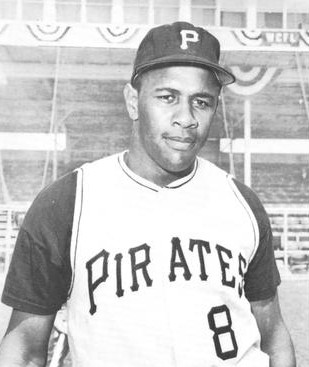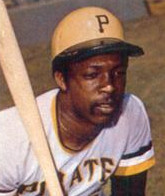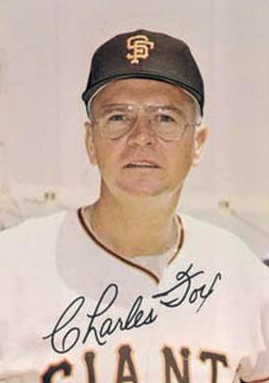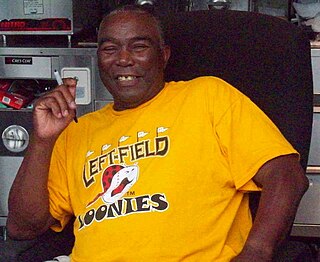Related Research Articles

Wilver Dornell Stargell, nicknamed "Pops" later in his career, was an American professional baseball left fielder and first baseman who spent all of his 21 seasons in Major League Baseball (MLB) (1962–1982) with the Pittsburgh Pirates. Among the most feared power hitters in baseball history, Stargell had the most home runs (296) of any player in the 1970s decade. During his career, he batted .282 with 2,232 hits, 1,194 runs, 423 doubles, 475 home runs, and 1,540 runs batted in, helping his team win six National League (NL) East division titles, two NL pennants, and two World Series championships in 1971 and 1979, both over the Baltimore Orioles. Stargell was a seven-time All-Star and two-time NL home run leader. In 1979, he became the first and currently only player to win the NL Most Valuable Player (MVP) Award, the NL Championship Series MVP Award and the World Series MVP Award in one season. In 1982, the Pirates retired his uniform number 8. He was inducted into the Baseball Hall of Fame in 1988.

The 1979 World Series was the championship series of Major League Baseball's (MLB) 1979 season. The 76th edition of the World Series was a best-of-seven playoff between the National League (NL) champion Pittsburgh Pirates (98–64) and the American League (AL) champion Baltimore Orioles (102–57). The Pirates won in seven games, becoming the fourth team in World Series history to come back from a three games to one deficit to win the Series. This marked the second time in the 1970s the Pirates won a World Series Game 7 on the road against the Orioles, the previous time being in the 1971 World Series. The Pirates were famous for adopting Sister Sledge's hit song "We Are Family" as their theme song during the 1979 season.
The 1971 World Series was the championship round of Major League Baseball's (MLB) 1971 season and featured the first night game in its history. The 68th edition of the Fall Classic was a best-of-seven playoff between the defending World Series and American League (AL) champion Baltimore Orioles and the National League (NL) champion Pittsburgh Pirates. The Pirates won the World Series in seven games, in large part because of superstar right fielder Roberto Clemente, whose all-around brilliance was on full display on a national stage. Game 4 in Pittsburgh was the first World Series game played at night.
The 1962 World Series was the championship series of Major League Baseball's (MLB) 1962 season. The 59th edition of the World Series, it was a best-of-seven playoff that matched the defending American League (AL) and World Series champion New York Yankees against the National League (NL) champion San Francisco Giants. The Yankees won the series in seven games for the 20th championship in team history. It is best remembered for its dramatic conclusion in Game 7; with runners on second and third base and two outs in the bottom of the ninth inning, the Giants’ Willie McCovey hit a hard line drive that was caught by Yankees second baseman Bobby Richardson to preserve New York's one-run victory. Yankees pitcher Ralph Terry was named the World Series Most Valuable Player.

Reinaldo Antonio Stennett Porte was a Panamanian professional baseball second baseman, who played in Major League Baseball (MLB) for the Pittsburgh Pirates (1971–79) and San Francisco Giants (1980–81). He batted and threw right-handed. A World Series champion with the Pirates in 1979, Stennett is one of two players to collect seven hits in a nine-inning game, which he did in a 22–0 victory over the Chicago Cubs, in 1975.
The 1991 National League Championship Series was played between the Atlanta Braves (94–68) and the Pittsburgh Pirates (98–64), with the Braves coming out on top in the Series 4–3. It was considered one of the best-pitched seven-game series of the modern era, featuring three 1–0 finishes and four shutouts, as well as four one-run games. The Braves went on to lose in the World Series to the Minnesota Twins in seven games.

Charles Francis Fox was an American manager, general manager, scout, coach—and, briefly, a catcher—in Major League Baseball. As manager of the National League West Division champion San Francisco Giants in 1971, he was named "Manager of the Year" by The Sporting News.

Richard Joseph Hebner is an American former professional baseball player and coach. He played in Major League Baseball as a third baseman from 1968 through 1985, most prominently as a member of the Pittsburgh Pirates teams that won five National League Eastern Division titles in six years between 1970 and 1975 and, won the World Series in 1971. After his playing career, Hebner spent several years as a hitting coach at the major league and minor league levels. He also managed minor league teams in the Pirates, Toronto Blue Jays and Baltimore Orioles organizations.

Manuel De Jesus Sanguillén Magan is a Panamanian former professional baseball player. He played in Major League Baseball as a catcher in 1967 and from 1969 through 1980, most notably as a member of the Pittsburgh Pirates teams that won five National League Eastern Division titles in six years between 1970 and 1975 and won the World Series in 1971 and 1979, twice over the Baltimore Orioles. He also played one season for the Oakland Athletics.

Robert Eugene Robertson is an American former professional baseball player. He played in Major League Baseball as a first baseman between 1967 and 1979, most notably as a member of the Pittsburgh Pirates teams that won five National League Eastern Division titles in six years between 1970 and 1975 and, won the World Series in 1971. He also played for the Seattle Mariners (1978) and the Toronto Blue Jays (1979). He missed the entire 1968 season due to a kidney obstruction.
The 1972 National League Championship Series was played between the Cincinnati Reds and the Pittsburgh Pirates from October 7 to 11. It was the fourth NLCS. Cincinnati won the series three games to two to advance to the World Series against the Oakland Athletics. The Reds became the first team in major league history to advance to the World Series without the best record in their respective league, made possible by the Junior and Senior Circuits each splitting into two divisions in 1969. In the previous three post seasons, the team with the best record in each league advanced to the World Series.
The 1985 National League Championship Series was played between the St. Louis Cardinals and Los Angeles Dodgers from October 9–16. It was the 17th NLCS and the first played under the new best-of-seven format. In previous years, the NLCS had been settled by a best-of-five format. This series is best known for Ozzie Smith's dramatic walk-off home run in Game 5. This is the second consecutive NLCS where a team overcame a 2–0 series deficit to win the series after the Padres did so in the best-of-five 1984 NLCS.
The 1979 National League Championship Series was played between the National League West champion Cincinnati Reds and the National League East champion Pittsburgh Pirates. It was the 11th NLCS in all.
The 1970 National League Championship Series was a match-up between the East Division champion Pittsburgh Pirates and the West Division champion Cincinnati Reds. The Reds swept the Pirates three games to none and went on to lose the World Series to the Baltimore Orioles. The series was the second NLCS.
The 1974 National League Championship Series was a best-of-five series that matched the East Division champion Pittsburgh Pirates against the West Division champion Los Angeles Dodgers. It was the sixth NLCS in all. The Dodgers won the Series three games to one and lost the 1974 World Series to the Oakland Athletics.
The 1975 National League Championship Series was a best-of-five match-up between the East Division champion Pittsburgh Pirates and the West Division champion Cincinnati Reds. It was the seventh NLCS in all. The Reds swept the Pirates in three games and went on to win the World Series against the Boston Red Sox.
The 1971 Pittsburgh Pirates season was the 90th season for the Pittsburgh Pirates franchise; their 85th in the National League. It involved the Pirates finishing first in the National League East with a record of 97 wins and 65 losses. They defeated the San Francisco Giants three games to one in the National League Championship Series and beat the Baltimore Orioles four games to three in the World Series. The Pirates were managed by Danny Murtaugh, and played their first full season at Three Rivers Stadium, which had opened in July the year before.

The 1972 Major League Baseball All-Star Game, the 43rd such game, was played on July 25, 1972. The all-stars from the American League and the National League faced each other at Atlanta Stadium, home of the Atlanta Braves. The National League came away with a 4–3 win in 10 innings.

The 2013 National League Division Series were two best-of-five-game series to determine the baseball teams to participate in the 2013 National League Championship Series. The three divisional winners and a fourth team — the winner of a one-game Wild Card playoff — played in two series. TBS carried most of the games, with some on MLB Network.
The 1971 Major League Baseball postseason was the playoff tournament of Major League Baseball for the 1971 season. The winners of each division advance to the postseason and face each other in a League Championship Series to determine the pennant winners that face each other in the World Series.
References
- ↑ "1971 NLCS Game 1 – Pittsburgh Pirates vs. San Francisco Giants". Retrosheet. Retrieved September 13, 2009.
- ↑ "1971 NLCS Game 2 – Pittsburgh Pirates vs. San Francisco Giants". Retrosheet. Retrieved September 13, 2009.
- ↑ "1971 NLCS Game 3 – San Francisco Giants vs. Pittsburgh Pirates". Retrosheet. Retrieved September 13, 2009.
- ↑ "1971 NLCS Game 4 – San Francisco Giants vs. Pittsburgh Pirates". Retrosheet. Retrieved September 13, 2009.
- ↑ Addie, Bob. "Bob Addie... Fully Recovered". The Washington Post. October 4, 1971. Retrieved September 13, 2015. "'The key play,' said Giants manager Charlie Fox, 'had to be in the sixth inning when we had the bases loaded. There were two out, remember, after Tito Fuentes struck out. That brought up Willie Mays and who would you like to have up in that situation? Willie, right? So Willie crashed the ball and Clemente made a great catch of the line drive. If that ball had been up a little bit… but that's the way it goes, doesn't it?"
- ↑ Christine, Bill. "Robby Snaps Out Of It Just In Time". The Pittsburgh Press. October 4, 1971. Retrieved September 13, 2015. "A walk to Ken Henderson loaded the bases, but Miller fanned Tito Fuentes and Clemente caught up with Willie Mays' screamer into right center. Clemente had moved about five yards closer to center before Mays came to the plate. 'It's a good thing he did,' Danny Murtaugh said, "because if he had to go five yards more, he wouldn't have made the play. The great ones have that instinct about where to play.'"